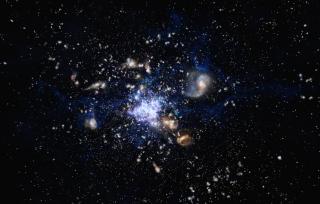Bibcode
Gowardhan, A.; Riechers, D.; Pavesi, R.; Daddi, E.; Dannerbauer, H.; Neri, R.
Referencia bibliográfica
The Astrophysical Journal, Volume 875, Issue 1, article id. 6, 6 pp. (2019).
Fecha de publicación:
4
2019
Revista
Número de citas
34
Número de citas referidas
34
Descripción
We report NOrthern Extended Millimetre Array (NOEMA) observations of
warm molecular gas traced by CO(5 ‑ 4) in a z∼ 3.2 gas-rich
main-sequence (MS) galaxy, initially serendipitously detected in CO(3
‑ 2) emission in “blind” deep NOEMA observations. Our
target shows a gas excitation consistent with that seen in z∼ 1.5 MS
galaxies ({L}CO(5-4)}{\prime }/{L}CO
(3-2)}{\prime }=0.41+/- 0.14), albeit toward the low end, as
well as a similar star formation efficiency based on the CO(3 ‑ 2)
line luminosity and the {L}IR}. However, it shows a high
molecular gas fraction ({f}gas}=0.9+/- 0.2) as compared to
z∼ 1.5 MS galaxies ({f}gas}∼ 0.42), consistent with a
cosmologically increasing gas fraction beyond z≳ 3 and our current
understanding of scaling relations between z, {f}gas}, the
stellar mass M *, and the specific star formation rate. Our
results are consistent with recent findings by the COLDz and ASPECS
molecular line scan surveys, and suggest that deep searches for CO
emission are a powerful means to identify gas-rich, star-forming
galaxies at high redshift.
Proyectos relacionados

Gas Molecular y Polvo en Galacias através del Tiempo Cósmico
Dos cuestiones fundamentales en la Astrofísica son la conversión de gas molecuar en estrellas y cómo este proceso físico depende del entorno en todas las escalas, desde sistemas planetarios, cúmulos estelares, galaxias hasta cúmulos de galaxias. El objectivo principal de este proyecto es el de estudiar la formación y evolución de galaxias a partir
Helmut
Dannerbauer